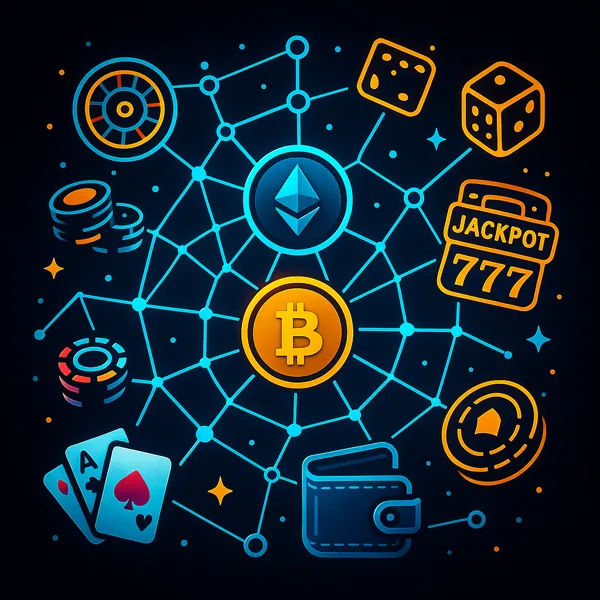Gambling has always had one big problem: trust.
In a traditional casino, you trust the dealer isn’t stacking the deck. In an online casino, you trust the operator’s RNG (random number generator). But let’s be honest — history is full of shady casinos rigging games, delaying payouts, or freezing accounts.
Enter decentralized gambling.
Thanks to blockchain and smart contracts, casinos no longer need to say “trust us.” The code itself guarantees fairness, payouts, and transparency. This is what the Web3 fam calls trustless betting.
Let’s break down how it works, why it matters, and real examples of decentralized gambling platforms changing the game.
What Is Decentralized Gambling?
Decentralized gambling means betting platforms run fully (or mostly) on the blockchain. Instead of relying on a central company to manage bets and payouts, smart contracts handle the entire process.
- Players connect with a wallet.
- Bets are placed directly into a smart contract.
- Random results are generated by decentralized oracles (like Chainlink VRF).
- Winnings are distributed automatically, no withdrawal request needed.
It’s gambling without middlemen, banks, or even a traditional casino operator. Just players + code.
Trustless Betting: The Key Idea
“Trustless” doesn’t mean “untrustworthy.” It means you don’t need to trust anyone.
In decentralized gambling:
- Rules are transparent. Smart contracts are open source. Anyone can check the math.
- Results are provably fair. Randomness comes from cryptographic oracles, not a black-box RNG.
- Payouts are automatic. If you win, the contract pays you instantly — no human can block or delay it.
This flips the casino model. Instead of “trust us,” it’s “verify it yourself.”
Real Examples of Decentralized Gambling
- Polymarket → Prediction markets where users bet on elections, sports, and world events. Fully on-chain, with outcomes verified by decentralized oracles.
- Augur (legacy project) → One of the first Ethereum-based prediction platforms, pioneering decentralized betting.
- Decentral Games (ICE Poker) → A metaverse poker room where results, chips, and payouts are on-chain.
- Dope Chain / Parlay → New projects building fully on-chain prediction streaks and jackpot systems, powered by smart contracts.
- Dice dApps on Ethereum, Solana, and BNB Chain → Simple on-chain coin flips and dice rolls that anyone can verify.
Why Decentralization Matters in Gambling
- Transparency → Every bet and payout is public. No shady backroom deals.
- Global access → Anyone with internet + wallet can play. No geo-blocks, no banks, no frozen accounts.
- Provably fair → Results come from oracles like Chainlink VRF, impossible to manipulate.
- Instant payouts → Smart contracts don’t ask you to “submit withdrawal request.” You win, you get paid.
- Players can be the house → Liquidity providers back the games and earn from the house edge.
According to DappRadar, decentralized gambling dApps already process millions of transactions monthly, despite being a niche today.
A Simple Example: Dice on the Blockchain
Here’s how a trustless dice game works:
- You connect your wallet and bet 1 USDC.
- The smart contract locks your bet.
- It calls Chainlink VRF, which spits out a provably random number between 1–100.
- If the roll is under 50, you win. If not, you lose.
- The smart contract instantly sends you your winnings — or keeps your bet.
No dealer, no hidden RNG, no human decision. Just code.
Benefits Over Web2 Casinos
- Web2: “We promise our RNG is fair.”
- Web3 (decentralized): “Here’s the math, check it yourself.”
- Web2: Withdrawals can take 3–7 business days.
- Web3: Payouts in seconds.
- Web2: Accounts can be frozen or geo-blocked.
- Web3: Borderless, wallet-to-wallet.
This is why Web3 gamblers from regions like Africa, LATAM, and Asia love decentralized platforms. No banks, no middlemen, just straight betting.
The Risks
Decentralized doesn’t mean risk-free. Watch out for:
- Smart contract bugs: If the code is flawed, hackers can exploit it.
- Liquidity risk: If pools are small, one whale win can drain funds.
- UX friction: Gas fees and wallet setup can scare beginners.
- Regulation: Governments haven’t caught up. Some may crack down on decentralized gambling.
The Future: Account Abstraction
One of the biggest problems today = wallets are still clunky. But with account abstraction, Web3 gambling will feel like Web2:
- Log in with email or Google → smart wallet runs in background.
- No gas fees → casino dApp covers them.
- Easy recovery → no seed phrases needed.
This tech could onboard millions of Web2 gamblers into decentralized betting without them even realizing they’re using blockchain.
Players can Really Be the House!
Yep. That’s correct! In many decentralized casinos, you don’t just bet — you can provide liquidity and earn from the house edge and have some sort of passive income with huge APR/high risk.
- Players deposit funds into smart contracts that bankroll games.
- The edge (say 3–5% on volume) is split between LPs, jackpots, and the platform.
- If volume is high, APRs can reach more than 50% per year.
Of course, short-term variance means LPs can still take hits when players win big — but long-term, the edge favors the house.
Final Word
Decentralized gambling is the purest form of Web3 betting. No middlemen, no trust games — just code, oracles, and math.
Does it solve every problem? Not yet. Wallet UX, gas fees, and regulation still slow things down. But as blockchains get faster and user onboarding gets smoother, trustless betting could go mainstream.
In the end, it all comes down to this:
- Web2 casinos ask you to trust them.
- Decentralized casinos let you verify them.
That’s why the future of gambling is transparent, borderless, and provably fair.
Welcome to trustless betting, fam. Wagmi 🚀


